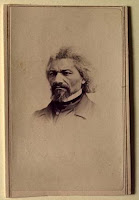Then...
For each suffragist profiled, we had a biography written. As the project manager, I reviewed everything before it went online, including the biographies. As an African American, the biography of Frederick Douglass caused me to ask questions. The acceptable words used to describe an African American have changed drastically since the 1800s. While it is possible to write about Douglass without using any of them, what words should be used to describe his second wife, who was not a woman of color? We all knew that detail needed to be stated, but what would be the correct words? I spent a long time asking people of their opinion. I even asked the question on a couple email discussion lists. I didn't feel as if I received good answers and my choice - European American - was not yet a term that was widely used (and it still isn't). Thankfully, our project historian located text of Douglass talking about his second wife and that text is how we talked about her. He said:No man, perhaps, had ever more offended popular prejudice than I had then lately done. I had married a wife. People who had remained silent over the unlawful relations of white slave masters with their colored slave women loudly condemned me for marrying a wife a few shades lighter than myself. They would have had no objection to my marrying a person much darker in complexion than myself, but to marry one much lighter, and of the complexion of my father rather than of that of my mother, was, in the popular eye, a shocking offense, and one for which I was to be ostracized by white and black alike. (Douglass, Life and Times… p. 534.)
Now...
Many weeks ago, I participated in a webinar where the first two speakers started their presentations by placing themselves in a theoretical or cultural context. When it became my turn, I quickly did the same, although I had not planned on doing so. At this point, I don't remember what I said about myself, but it likely included that I come from a corporate background and that I'm originally from south-central Pennsylvania (and yes that does matter). I believe the other two women included in their descriptions the theories they use for their mental models.A few weeks ago, I was at a training session where we were asked to provide our preferred pronouns when we introduced ourselves. This was not my first encounter with the need to do this, but the first time that one person's preferred pronouns (they/them/their) caused a bit of angst among a couple of the participants.
When we look at historical figures - those who are no longer living - we often have to put them in context, because they did not do that for themselves. Most did not publicly state what words they wanted used when describing them. Nor did they state the framework they used when thinking about an issue. We use whatever information we can find to try to build that context, knowing that it could be quite flawed. A good example of this is Eleanor Roosevelt's relationship with two of her female friends. People guess and speculate, but Roosevelt left nothing behind to put those friendships in a context, which answers the questions we have.
While we were fortunate with Winning the Vote to find text of Douglass talking about his second wife, we really don't know what words he or she (Helen Pitts Douglass) used to describe her ethnicity. Now, however, we have an opportunity to build the context for a living individual whom we are adding to a repository (e.g., The History Makers). What might we capture in text or metadata? The first thoughts that come to my mind are:
- How the person prefers to be addressed. This would include pronouns as well as honorifics. I think of Mrs. Medgar Evers (Myrlie Evers-Williams) who has spoken publicly on what it means to her when someone she does not know calls her first name.
- Better information on the person's ethnicity. With more people having their DNA tested, we should capture more than the category the person fits into for the Census. Personally, my ethnicity is more complicated that I thought, based on my DNA results, yet I identify out of habit as being African American.
- The words and phrases the person uses to describe himself/herself/themselves. This might be how the person describes their work or personal life. For example - and thinking of a family member - is the person an architect, artist, professor, or all three?
- The person's gender, gender identity, and sexual orientation. While a person might not want to have this shared publicly, I would hope that the person would understand its usefulness, in terms of context, in the future. I think of David Bowie, how he lived his life, and then the speculations which occurred after his death.
- Information on what influenced the person. This could be where the person grew up, what tradition the person was trained in, or something else.
By the way, perhaps we each should get this started by writing this information for ourselves and placing it somewhere were it can be found (online or offline).
The photo is of a Carte de visite showing Frederick Douglass. This work is the collection of St. John Fisher College, Lavery Library.

No comments:
Post a Comment